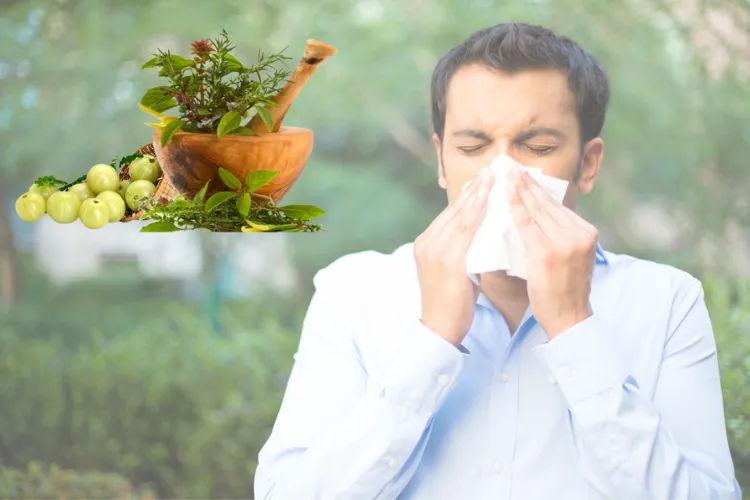Ayurveda has a cure for every allergy
Dusty environments, certain types of food or certain metals can make you sneeze, runny nose or blisters on the skin. These are symptoms of allergy. Allergy is a common term and most of us are aware of it. However, allergies are medically encapsulated as an overreaction of the body’s immune system. This reaction is not a specific process, but is harmful to the body. What exactly is an allergy? (What is Allergy?) Basically, allergies develop through sensitization of your immune system against specific substances. These substances are called allergens and your body’s response is called an allergic reaction.
Mild fever, redness or blistering on the skin, eczema, difficulty in breathing, etc. are the main symptoms of asthma to allergic reaction. It sometimes causes stomach ulcers and sometimes even death due to anaphylactic shock. This is a rare but serious allergic reaction, mostly caused by food, insect bites or certain medicines. A person who is coming in contact with an allergen for the first time does not develop any allergy. Assuming they are sensitized for a long period of time, the body develops a type of non-specific immune response called an allergic attack.

Table of Content
Overview of modern medicine
There is no 100% cure for allergies. Modern science also suggests that the best way to treat allergies is to keep distance from the allergen. For mild ailments one can take antihistamine tablets. One can talk to an allergist about immunotherapy. They give pills or oral drops to reduce the allergy, but they are not a complete cure. Here is a list of some of the modern medical methods that doctors prescribe for allergy treatment.
Antihistamines: The body produces histamine when exposed to an allergen. Histamine affects your tissues and it can cause problems like a runny nose, difficulty in breathing. Antihistamines counter the production of histamine. Antihistamines are the mainstay of treatment for mild allergies.
Decongestants: These help to heal swollen tissues and blood vessels, but are not effective against rashes or itching.
Anticholinergic nasal sprays: When this medicine is sprayed into the nostrils of the nose, they decrease nasal secretions and clear the nasal passages and stop a runny nose.
Steroids: Steroidal nasal sprays are used in severe cases. It is a prescription based medicine, which reduces the swelling of the nasal passages.
Leukotriene blocker: This drug works by blocking the production of leukotriene, a chemical that causes the nasal passages to swell and produce mucus. A drug called Singulair is used as a leukotriene inhibitor and is often used in asthma.
Mast cell inhibitors: Mast cells are the first drugs of their kind produced during an allergy bout. Cremaelin Sodium is a mast cell inhibitor, which prevents rhinitis and itchy eyes.
All these medicines should be taken under the guidance of expert medical practitioners. They can also have side effects.
If you need any support with your mood swings, our wellness Counsellors can help you.
Opinion on Allergies in Ayurveda
Ayurvedic science (Ayurvedic medicine for allergies) believes that allergies are a disorder. It is mainly due to a faulty digestive process. Certain symptoms like indigestion, constipation or diarrhea serve as signs of allergy. This discrepancy in the digestive system can be caused by certain types of food, pollen or medication. In the respiratory tract, there may be accumulation of mucus or pollen and it may obstruct your respiratory tract. The result may also be rhinitis, cough, sneezing or dyspnoea.
Whenever a person’s immune system comes in contact with an allergen, Kapha, Vata or Pitta become imbalanced and the body releases certain toxins, which can locally damage organs or particular circulatory systems. Basically, Ayurveda is based on three basic types of energy or functional principles, which are present in every human being. These are called Tridosha principles. When all these three doshas i.e. Vata, Pitta and Kapha are balanced then the body remains healthy. For example if pitta dosha is imbalanced, toxins tend to accumulate in the bloodstream, joints, muscles or lymph nodes. If there is an imbalance in Kapha dasha, toxins accumulate in the respiratory tract and blockage can occur.
Ayurvedic Remedies for Allergies, Focus on Calming the Radar Supplements Vehicle focuses. Along with lifestyle changes, herbal supplements, herbal juices and herbs help in smooth digestion. There are also many commercially available Ayurvedic tonics and tablets for the treatment of allergies. Some of them are mentioned below.
Ayurvedic Supplements (Herbal Supplements)
- Histantin Tablet: It is helpful in the treatment of allergic rhinitis. During an allergic bout or rhinitis, a compound called histamine is released into the bloodstream. Histantin controls histamine and it naturally provides a shield. Histantin includes Katuki, Jatamami, Nagakeshara, Vacha, Turmeric, Pushkarmool, Jeera, Kiratitak, Bhunimba, Prapunnad.
- Brihat Haridra Khanda: It is known to treat skin allergies. It soothes itchy skin and regulates fluctuations in body temperature.
- Rinagra Capsule: It is used for the treatment of allergies related to the respiratory system (allergic rhinitis treatment in Allergies). It acts as an analgesic and expectorant.
- Bromelain: This is an enzyme found in papaya and pineapple. They naturally improve breathing by reducing inflammation.
- Probiotics: These are natural bacteria that are good for your gut. They help in improving the digestive system. There are many herbal supplements that can be used to treat allergies. However, apart from medicine, Ayurveda recommends non-medicinal help like exercise, yoga, meditation. Let’s know about them.
The best possible way to treat allergies (best ayurvedic medicine for allergies) is to avoid the causative agent. In Ayurveda it is seen in two phases.
If you need any support with your mood swings, our wellness Counsellors can help you.
Refinement
It is a kind of detoxification and purification method. It helps to balance the doshas and eliminate excess toxins from your body. It improves the immune system. There are 5 types of detoxification.
- Vomiting: For cough allergy
- Virechana: For bile allergy
- Enema: For Vata Allergies
- Blood Purification: For Bile Allergies
- Nasal Cleansing: For phlegm allergies.
Quenching
Treatment for allergic reactions. It manages your countries.
Management of allergies related to vata
- Avoid food like potatoes, tomatoes, legumes.
- Avoid cold, dry weather.
- Take vata suppressing diet.
- Consume herbs like Trikatu, Triphala, Ashwagandha, Guggal
- Take ginger, cumin, lemon in food.
- Warm Mahanarayan oil can be applied. It can also be consumed by mixing it with water.
What is Tridosha in Ayurveda psychology? Talk to an online therapist to learn more about it.
Management of allergies related to bile
Avoid pungent spices, salt. Make sure the food is cooked properly. Take bitter and astringent food like green vegetables.
Avoid hot and humid conditions. Avoid direct rays of the sun.
Take a diet that suppresses pitta.
Herbs like Shatavari, Guduchi, Triphala, Brahmi and Neem can be used. Neem and Manjishtha is a very good combination for skin related conditions. Both these herbs have blood purifying properties.
Other herbs like sandalwood and rose are good for external application.
Consult an expert Ayurveda Counselor to get yourself treated for any kind of issue.
Management of cough-related allergies
Kapha is a cold dosha, so avoid cold and stagnant foods like cheese, curd, milk, cream etc.
Eat spicy cooked hot food.
Avoid cold conditions.
Ayurvedic oils can be used in the treatment of nose.
For symptoms of runny nose, sneezing and congestion, Jalneti (nasal wash) is beneficial.Apart from controlling medicine, diet and lifestyle, you can also choose yoga. It is always recommended that you consult a qualified Ayurvedic practitioner before starting any detoxification process to eliminate ama matter or taking Ayurvedic herbs for skin disorders. The protocol of treatment can change depending on the body composition and disease of a person.
Conclusion
Once the body is sensitized to a particular allergen, the immune memory is maintained in the body for a long period of time. However, treatment is meant as a preventive measure and it tries to control the severity. Once you know the type of allergen affecting you, the best way is to avoid coming in contact with it. For food allergens, avoid that component of food in your diet, for dust allergies avoid going in dusty conditions and try to wear dust resistant mask. Avoiding the allergen is the best possible way. However, if you cannot avoid it due to lifestyle, then you have to rely on medicine. We wish you good health.
Can the prostate be cured completely by any therapy? Talk with an online therapist now.
















